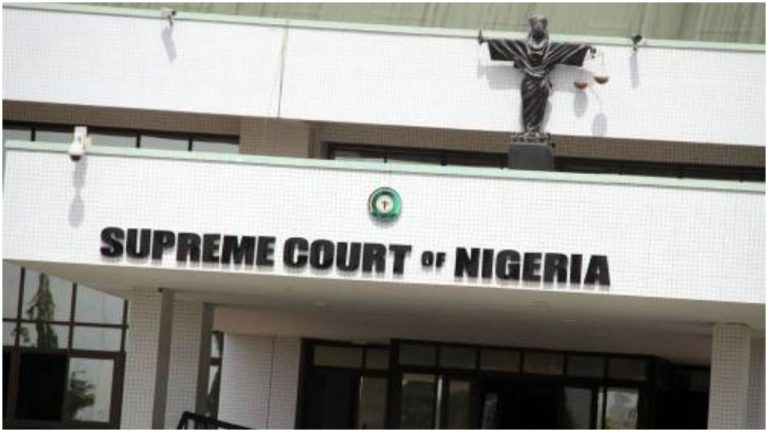The Supreme Court docket has affirmed that the management of actions on the nation’s inland waterways, together with levying and licensing operators within the sector, belongs solely to the Federal Authorities.
The apex court docket, in a judgment obtained by our correspondent, held that it was improper, illegal and unlawful for states to hunt to regulate the sector and impose levies on companies working within the nation’s inland waterways.
It held that present legal guidelines give unique management of actions within the nation’s inland waterways to the Federal Authorities by way of its businesses – the Nationwide Inland Waterways Authority, NIWA, and the Nigerian Maritime Commonplace and Security Company, NMSSA, – and no different tier of presidency.
The judgment, authored by Justice John Inyang Okoro however learn by Justice Emmanuel Akomaye Agim, was on the enchantment marked SC/CV/17/2018, filed by the NIWA, NMSSA, the Minister of Mines and Metal Improvement, and the Minister of Transport.
Respondents to the enchantment have been the Lagos State Waterways, the state’s Commissioner for Waterfront Infrastructure Improvement, the state’s Legal professional-Normal, the Governor of Lagos State, the Integrated Trustees of Affiliation of Vacationer Boat Operators and Water Transportation of Nigeria, ATBOWTN, and the Integrated Trustees of Dredgers Affiliation of Nigeria, DAN.
The enchantment filed 2018 was prosecuted for the appellants by a group of attorneys led by Prince Lateef Fagbemi (SAN), now the Legal professional Normal of the Federation, AGF, and Minister of Justice.
The Supreme Court docket agreed with Fagbemi’s argument that NIWA is the one company saddled with the accountability to levy, impose, and cost charges of utilization alongside the declared waters of the Nigerian Inland Waterways Authority.
It added that NIWA is the rightful and authorized company of the Federal Authorities with the powers to solely handle, direct and management all actions on the navigable waters and its proper of approach all through the nation for inland navigation, pursuant to Sections 8 and 9 of NIWA Act.
The court docket equally agreed with Fagbemi that the actions of the Lagos authorities and its businesses represent a flagrant usurpation and an unlawful encroachment on the statutory capabilities of NIWA as a result of the waterways of Lagos State, amongst others in Nigeria, fall underneath the Unique Legislative Listing set out in Half 1 of the Second Schedule to the 1999 Structure.
It held that it’s only the Federal Authorities, by way of the Nationwide Meeting, that may validly legislate on Maritime Transport and Navigation, including that the ability to legislate on any topic within the Unique Legislative Listing doesn’t lie with the Lagos State Authorities.
The appellants had additionally argued that the actions of the Lagos State Waterways Authority, LASWA, created by the Lagos Authorities, by way of the enactment of LASWA Legislation No. 14 of 2008 (LASWA 2008) by the state’s Home of Meeting, to manage, develop and handle all facets of the waterways in Lagos State is unconstitutional.
The court docket famous that present legal guidelines don’t favour the Lagos authorities’s arguments on useful resource management however that political stakeholders, together with the Legislature, might work on methods to amend the legislation to deal with the priority raised by Lagos and others on the difficulty.
The Supreme Court docket restored the judgment delivered on March 28, 2014, by Justice John Tsoho of the Federal Excessive Court docket in Lagos and reversed the July 18, 2017, judgment of the Court docket of Attraction (Lagos division), which put aside the Federal Excessive Court docket judgment.
The Court docket of Attraction had, amongst others, held that the inland waterways inside Lagos State, not captured by the Nationwide Inland Waterways Act, are throughout the legislative competence of the state’s Legislature and that the state might gather taxes/levies on companies on waterways which begin and terminate within the state.
Confronted with a regime of a number of prices by the businesses of each the Federal and Lagos governments, ATBOWTN and DAN in 2012 filed a swimsuit, marked FHC/L/CS/543/2012, on the Federal Excessive Court docket, Lagos, to find out which tier of presidency was empowered by extant legal guidelines to license and levy enterprise operators on the nation’s inland waterways.
In his judgment on the case, Justice Tsoho held, amongst others, that NIWA and NMSSA are the right and lawful businesses with authority in issues regarding the industrial actions of ATBOWTN and DAN, who’re concerned in water tourism, water transportation and sand dredging throughout the nationwide inland waterways.
Justice Tsoho restrained the Lagos State Waterways Authority and the state’s Commissioner for Waterfront Infrastructural Improvement from additional in search of to regulate the industrial actions of the plaintiffs – ATBOWTN and DAN.
The choice of Justice Tsoho was, nonetheless, put aside by the Court docket of Attraction in its July 18, 2017 judgment on the enchantment, marked CA/L/886/2014, filed by the Governor of Lagos State and three others.
NIWA and three others challenged the Court docket of Attraction’s determination on the Supreme Court docket, which within the January 5, 2024 judgment reversed the choice of the decrease court docket and affirmed the March 28, 2014 judgment by Justice Tsoho of the Federal Excessive Court docket.
